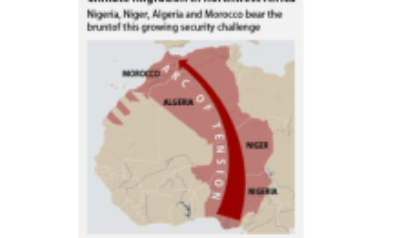
Background With the Kyoto Protocol set to expire at the end of this year, and the 20th anniversary of the Rio Earth Summit about to take place in June, it would seem that addressing climate change should be on everyone’s minds. Scientists first started noticing the upward trend in atmospheric CO2 as early as the 1950s. Yet up until the 1990s, the so-called ‘global warming’ debate centered on the reliability of the data, and whether the phenomenon was in fact real at all. As scientific consensus grew, the mounting evidence finally led to the landmark Kyoto Protocol in 1997, a legally binding treaty. The term ‘global warming,’ which refers to the global average temperature, was gradually replaced with the term ‘global climate change’ to reflect the fact that the new climate regime would be characterized by wilder and more extreme weather. Doubts nevertheless persisted, largely among political circles, but also among a handful of scientists. The data being difficult to refute, the point of contention had shifted from the question of whether global warming was real to whether it was in fact anthropogenic. Fingers were pointed variously at the glacial cycle, at the sun’s own cycle, at anything other than the vast quantities of fossil energy our civilization has been sending into the atmosphere since the industrial revolution. Climate scientists on both sides have had to contend with occasional attacks on their integrity, which have added to the atmosphere of polarization that characterizes the climate issue. Even as governments dither in setting and reaching their own targets – as reflected by the collapse of every subsequent climate summit - others are reacting to the already visible effects of climate change. The language of the United Nations and development-focused NGOs around the world has shifted from prevention to mitigation. The notion of the “Green Economy” is being championed by both public and private sectors. However none of the measures in the ‘zero draft’ document of the Rio +20 summit are binding. It is run by leaders from the banking industry. So great is the skepticism of academics and the public over this latest earth summit, that in March an entirely separate one called “Planet Under Pressure” was organized in London to call to task those charged with steering us toward a more sustainable future. Why is it relevant? Enormous funds are being channeled toward more scientific research – this time, assessing the impacts of climate change, and attempting to forecast how species and ecosystems may respond. As environments change, important political lines may also be shifting. This is exemplified by the mere existence of the famed “Northwest Passage,” a potential shipping route between the Atlantic and Pacific that cuts through the thin ice of the Arctic. Even as nations squabble over whose responsibility it is to address climate change and resist doing so within their own borders, they are eagerly awaiting the opportunity to draw new ones. These are the spoils of climate change. The terms used to describe these planetary-scale changes are themselves fluid. Most recently, the word ‘climate’ has been dropped altogether, in favor of ‘global change’. This latest morph is accompanied by corresponding adjustments in scientific disciplines, funding, and public policy. It is difficult somehow to escape the conclusion that underlying all of this activity is a tacit admission on all sides that not only are we past a point of no return, we are unwilling to even make an attempt at reaching a new equilibrium. Climate change is starting to be viewed – correctly – as only one of a raft of dramatic changes taking place in this era of our own making, recently dubbed “the Anthropocene”. The outcome, in reality, may now be largely beyond us. Mitigation is merely damage control. What the climate change issue best illustrates is how easily a phenomenon of great consequence for humanity and all other species can be lost amidst the smoke and mirrors of political rhetoric. It shows how vulnerable scientists can be, when asked to communicate their views while perpetually having to defend them. It highlights as well how easily science itself is misunderstood, how its evidence can be can be ignored or distorted to suit the needs of the few that benefit from the status quo. As of last year, 191 states as well as the EU had ratified the Kyoto Protocol. Currently the United States and Canada keep company with Afghanistan and Southern Sudan as notable exceptions, who have either failed to ratify it or refuse to. We are not short on ideas. While the technical, and even financial innovations necessary to bring about a greener economy and sustainable future may already exist, the question remains - what will it take for us to implement them?
For more than 10 years, Fair Observer has been free, fair and independent. No billionaire owns us, no advertisers control us. We are a reader-supported nonprofit. Unlike many other publications, we keep our content free for readers regardless of where they live or whether they can afford to pay. We have no paywalls and no ads.
In the post-truth era of fake news, echo chambers and filter bubbles, we publish a plurality of perspectives from around the world. Anyone can publish with us, but everyone goes through a rigorous editorial process. So, you get fact-checked, well-reasoned content instead of noise.
We publish 2,500+ voices from 90+ countries. We also conduct education and training programs on subjects ranging from digital media and journalism to writing and critical thinking. This doesn’t come cheap. Servers, editors, trainers and web developers cost money.
Please consider supporting us on a regular basis as a recurring donor or a sustaining member.
Support Fair Observer
We rely on your support for our independence, diversity and quality.
Will you support FO’s journalism?
We rely on your support for our independence, diversity and quality.







